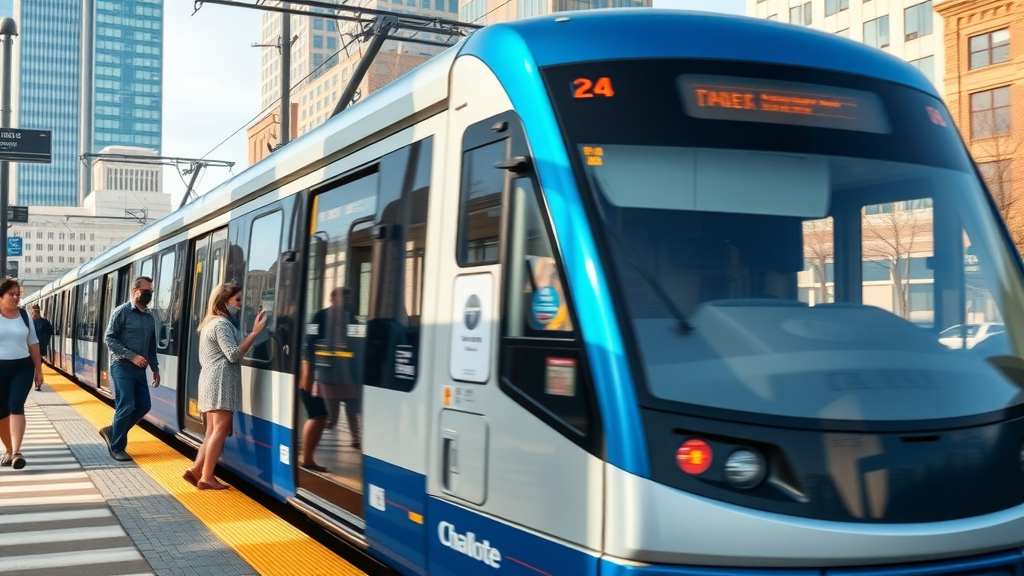Did you know that Charlotte, NC has grown by more than 20% in the past decade, making it one of the fastest expanding cities in the United States? If you’re considering living in Charlotte NC , you’re about to join a vibrant, booming city with a unique blend of career prospects, culture, and Southern hospitality. But relocating to a large city like the Queen City comes with surprises—both wonderful and challenging. In this guide, you’ll get the facts, insights, and expert tips you need for a truly seamless move.
Revealing the Truth About Living in Charlotte NC: A Surprising Look
- Did you know Charlotte has grown by more than 20% in the past decade, making it one of the fastest expanding cities in the U.S.? This article unpacks the latest trends, life quality, and key considerations for living in Charlotte NC.

Top Essentials Everyone Moving to Charlotte NC Should Know
- Charlotte, known as the Queen City, is North Carolina’s largest metropolis and a national financial hub.
- It ranks consistently for job opportunity and population growth, but also faces concerns like traffic and housing competition.
If you’re moving to Charlotte NC , there are a few things you need to know up front. As the largest city in North Carolina , Charlotte attracts ambitious professionals, young families, and retirees alike. Renowned for its impressive skyline and thriving business sector—especially finance (think Bank of America and Truist)—the city offers more jobs than almost anywhere in the state. At the same time, be prepared for increased competition in the housing market and daily commuting during rush hour, as the rapid influx of residents has led to some growing pains. Still, the Queen City charms newcomers with its greenways, diverse neighborhoods, and affordable cost of living, ensuring there’s a fit for every lifestyle.
Schools, transportation, and outdoor activities are all worth investigating before you commit to a neighborhood. Charlotte’s mix of urban amenities and Southern charm make it an attractive place to live, but like any rapidly expanding metro area, understanding the pros and cons is vital. Whether you’re a young professional eager to dive into the job market or a family searching for great schools and parks, Charlotte delivers on both opportunity and quality of life.
What You'll Learn About Living in Charlotte NC
- Deep-dive into the pros and cons of living in Charlotte NC.
- Cost of living breakdown versus the national average.
- Analysis of the job market and what industries are booming.
- A neighborhood-by-neighborhood look at the Charlotte area.
- Transportation, schools, outdoor activities, and more.
Snapshot Comparison: Cost of Living in Charlotte NC vs the National Average
| Category | Charlotte NC | National Average |
|---|---|---|
| Housing | $320,000 | $410,000 |
| Utilities | $130/month | $150/month |
| Groceries | $350/month | $400/month |
| Transportation | $70/month | $95/month |
10 Pros and Cons of Living in Charlotte NC
-
1. Job Market in Charlotte NC: Booming Sectors and the Queen City Advantage
Charlotte’s job market is among the strongest in the Southeast, driven by major sectors like finance, healthcare, tech, and energy. The city is home to Bank of America’s headquarters, Truist Financial, and major offices for Wells Fargo, making it a magnet for ambitious professionals. Over the past decade, tech start-ups and healthcare providers have joined the ranks, offering newcomers diverse career opportunities and strong salary growth potential.
The city’s low unemployment rate (consistently below the national average) and flourishing economy offer security for families and young professionals alike. However, with growth come challenges; some fields see fierce competition and talent shortages, so researching your industry before moving to Charlotte is key. For those in banking, healthcare, or tech, the Queen City offers unmatched opportunity.
-
2. Cost of Living in Charlotte NC: Lower than the National Average?
One of the most appealing aspects of living in Charlotte NC is its affordable cost of living . Compared with other large city hubs, Charlotte boasts lower housing prices and everyday expenses. The median home price ($320,000) sits well below the national average , while rental rates remain manageable, especially outside of uptown Charlotte. Utilities and groceries also cost less than in major metros, making the city attractive to families and young professionals alike.
While housing costs are climbing due to heightened demand, especially in trendy neighborhoods like South End and Dilworth, overall expenses still beat the average U.S. metro. If you’re watching your budget but seeking big-city amenities, Charlotte delivers significant value—just act quickly when you find a home you love!
-
3. Dining & Nightlife: Exploring the Social Scene in Charlotte
The Queen City’s dining and nightlife scene rivals any state’s urban center. South End pulses with trendy restaurants and craft breweries, while NoDa (North Davidson) boasts the city’s creative food trucks, live music, and colorful murals. From fine dining along Tryon Street to late-night jazz lounges in Plaza Midwood, there’s never a dull evening in Charlotte.
Sports fans flock to uptown Charlotte for Carolina Panthers games, and music lovers enjoy frequent festivals and concerts. If you value a balance of eclectic culture and buzzing energy, you’ll thrive in this dynamic social atmosphere.

-
4. Education and Schools: What to Expect from Charlotte’s Academics
Education in Charlotte NC is a top priority for families. The Charlotte-Mecklenburg Schools (CMS) district encompasses award-winning public schools alongside numerous magnet, charter, and private options. Popular suburbs such as Ballantyne and Myers Park are especially coveted for their strong academic records and community involvement.
Higher learning is equally accessible, with institutions like the University of North Carolina at Charlotte and Queens University offering programs for every field. The city’s emphasis on education, both at K-12 and collegiate levels, makes it a good place to live for academic-minded households.
-
5. Outdoor Activities and Recreation in Charlotte NC
Charlotte’s greenways and parks make outdoor living accessible all year. The city offers bike trails, tennis courts, and scenic spaces like Freedom Park and Crowders Mountain State Park—ideal for hiking, jogging, and family outings. The proximity to the Blue Ridge Mountains and Carolina beaches also appeals to nature lovers.
Annual festivals, sporty neighborhoods, and an extensive network of recreation centers ensure everyone finds their niche, whether cycling, playing team sports, or attending outdoor concerts. When living in Charlotte NC, work-life balance is always within reach.

-
6. Transportation and Public Transit Options in Charlotte
The city’s public transportation is continually evolving. The Charlotte Area Transit System (CATS) offers the LYNX Blue Line light rail, expanded bus routes, and plans for future commuter lines. This gives newcomers flexibility, especially for those commuting to uptown Charlotte or outlying business hubs.
Bikers and walkers benefit from growing greenway networks, while drivers should prepare for moderate—sometimes heavy—traffic at peak times. Nationally, Charlotte ranks average for congestion, but with ongoing investment in transit infrastructure, it’s getting easier to move around every year.

-
7. Real Estate and Best Places to Live in Charlotte NC
The Charlotte area features a mosaic of unique neighborhoods. Uptown Charlotte is the heartbeat of business and nightlife, while South End and Dilworth blend walkability with chic, restored homes. NoDa bursts with art and music, and Ballantyne’s top schools and leafy streets attract families.
Myers Park, known for stately homes and shady oaks, is highly sought-after for its historic charm. Whether you want fast-paced city living or quiet suburban comfort, Charlotte offers a range of places to live to match any need.
-
8. Weather in Charlotte: Mild Winters, Hot Summers
Expect four seasons in Charlotte NC— mild winters that rarely see snow, and long, steamy summers. Spring and fall are especially beautiful, with comfortable temperatures and bursts of color. While the city isn’t immune to the occasional tropical storm or heavy summer rain, overall climate is favorable to outdoor activities year-round.
Be prepared for humidity in July and August, and a few wet, blustery days during hurricane season. Still, Charlotte’s climate is a major draw for those tired of harsh northern winters or looking for more sunshine with their move.
-
9. Comparisons: Charlotte NC vs Raleigh NC
Choosing between Charlotte and Raleigh is an age-old North Carolina debate. Both feature rapid job growth, excellent universities, and cultural vitality. Charlotte stands out as the financial capital, while Raleigh is noted for its smaller downtown, government and research sector jobs, and slightly more relaxed pace.
Charlotte NC vs Raleigh NC: Key Statistics Metric Charlotte NC Raleigh NC Population 890,000 470,000 Median Home $320,000 $365,000 Job Growth 2.1% 2.5% Avg. Commute 26 mins 24 mins Ultimately, the right place to live depends on your priorities—finance and urban excitement in Charlotte, or academics and research-minded community in Raleigh.
"Choose Charlotte if you crave fast-paced business growth, or Raleigh for a more relaxed, research-driven environment." - Regional Analyst
-
10. Biggest Issues & Cons of Living in Charlotte NC
Growth brings challenges: traffic congestion frustrates locals, and affordable housing is increasingly hard to find close to the city center. Some neighborhoods have experienced gentrification , with communities seeing increasing disparities in opportunity and access to resources.
Weather can also be unpredictable—rainy days and steamy summer humidity catch some transplants off guard. Still, most residents agree the rewards outweigh the drawbacks. Talk to locals and do your homework before you move to Charlotte for the best results!
"Charlotte offers big city perks with a welcoming Southern vibe—no wonder so many people are moving to Charlotte!" - Local Resident
Living in Charlotte: Financial Perspective on Cost of Living
- Average housing prices by neighborhood
- Rental market trends and what you get for your budget
- How Charlotte’s expenses compare to other North Carolina cities
Charlotte’s cost of living remains lower than many major cities, even as real estate demand heats up. Housing prices vary—expect to pay more in established areas like Myers Park or Dilworth, and less in suburban neighborhoods or up-and-coming districts like Plaza Midwood. Rental rates in the city center average $1,300-$1,600 for a one-bedroom, but prices decrease further from the uptown core.
Compared to cities like Raleigh or Winston-Salem, Charlotte still provides affordable options for both buyers and renters. Utilities, groceries, and local services also fall below—not above—the national average, making living in Charlotte NC an appealing choice for cost-conscious movers. Use your budget wisely and take time to explore which neighborhood best fits your financial plan.

Charlotte Area Neighborhood Guide for New Residents
- South End: Vibrant, walkable, full of art and eats
- Dilworth: Historic charm with modern conveniences
- Ballantyne: Suburban, family-friendly, top-rated schools
- NoDa: Artsy, eclectic, music and brewery hotspot
- Uptown: The heart of business, nightlife, and finance
Each neighborhood in the Charlotte area offers something unique. South End captures the city’s youthful energy, with walkable streets and vibrant street art. Dilworth appeals to those who seek history with the benefit of easy proximity to downtown. Ballantyne is a top pick for families due to school quality and suburban comforts.
For those drawn to creativity and nightlife, NoDa provides a colorful, ever-changing scene—there’s always new music, fresh murals, and indie cafes to discover. Uptown Charlotte is the pulse of the city and a hub for both business and after-dark fun. No matter your personality, you’ll find a place to live in Charlotte that feels like home.

Job Market in Charlotte NC: What’s Hot in the Queen City
- Finance, tech, healthcare: Biggest sectors and top employers
- Unemployment rate trends and what newcomers should expect
- Salary benchmarks and career growth potential
The Queen City isn’t just a financial titan for the Southeast; it’s also on the up-and-up in tech and healthcare. Major companies like Bank of America, Duke Energy, and Atrium Health have headquarters here, while fintech and start-up spaces are expanding. Salary benchmarks remain strong across skilled sectors, which is good news for those considering a move to Charlotte.
The unemployment rate continues to trend below the national average, making job hunting less stressful than in many comparable cities. With broad career options and active hiring markets, it’s no wonder young professionals and families alike choose to set down roots here.

Moving to Charlotte: A Timeline and To-Do List
- Choosing the best time of year to relocate: Consider moving in spring or fall for mild weather.
- How to secure housing before your move: Start searching early, work with local real estate agents, and schedule virtual tours to get ahead of competition.
- Licensing, utilities, and North Carolina DMV tips: Set up your driver’s license, research utility providers, and register your car soon after arriving.
Advance preparation is crucial to a smooth move to Charlotte. Weather and rental cycles can influence pricing and availability; plan ahead and lean on local expertise for best results.

Public Transportation and Getting Around Charlotte NC
- Charlotte Area Transit System (CATS): LYNX light rail, bus routes, and future expansions
- Commuting, bike trails, and walkability
- How Charlotte traffic compares to national averages
Public transportation in Charlotte is spearheaded by the LYNX Blue Line, a reliable light rail system running from the suburbs into uptown. The CATS bus network covers most of the metropolitan area, with future expansions planned to improve connectivity. For those who enjoy alternative commutes, bike trails and greenways are increasingly popular.
Charlotte’s traffic is typical for a city its size—some congestion during peak hours, but improvements are ongoing. Many neighborhoods are becoming more walkable thanks to new development, making it easier to ditch the car for everyday errands or a night out.

Outdoor Activities and Entertainment While Living in Charlotte NC
- Hiking and greenways: Top outdoor destinations
- Sports, music festivals, and annual city events
- Family-friendly parks and community recreation
Outdoor enthusiasts will love living in Charlotte NC . Enjoy scenic hikes at Crowders Mountain State Park or stay closer to home with greenways like Little Sugar Creek and Freedom Park. The Charlotte area hosts major sports events (Carolina Panthers and Charlotte Hornets), world-class concerts, and annual festivals celebrating everything from barbecue to jazz.
Family-friendly amenities abound—splash pads, playgrounds, and weekly outdoor markets bring the community together. Whether you’re a mountain biker, a music fan, or just love a good food festival, you’ll find plenty to enjoy.

"The best part of living in Charlotte? Being minutes away from the Blue Ridge Mountains and Carolina beaches." - Outdoor Enthusiast
Living in Charlotte NC: Social Life, Culture, and Community Spirit
- Charlotte’s southern hospitality and diverse populations
- Local arts scene, museums, and Queen City traditions
Community is at the heart of the Charlotte experience . The city takes pride in its welcoming attitude, strong neighborhood ties, and supportive, diverse communities. It’s easy to find a sense of belonging whether you’re joining a local running club, volunteering, or attending annual events like the Charlotte SHOUT! festival.
The Queen City is also rich in culture—explore The Mint Museum, catch a Broadway show at the Blumenthal, or stroll gallery openings in NoDa and South End. Arts, music, and food are woven into the fabric of daily life here.

Education in Charlotte NC: Top Schools and Higher Learning
- Charlotte-Mecklenburg Schools (CMS) rankings
- Charter, magnet, and private education options
- Nearby universities and continuing education
Education in the Charlotte area is characterized by diversity and choice. Top public schools in Ballantyne and Myers Park draw families for their academic performance and extracurricular options. Private, magnet, and charter schools across the city help families find the right fit for their children’s learning style or interests.
Charlotte’s higher education landscape is equally impressive, with the University of North Carolina at Charlotte—an emerging research hub—plus Johnson & Wales, Queen’s University, and CPCC offering career advancement and enrichment opportunities.

Living in Charlotte: Healthcare Resources and Medical Centers
- Leading medical centers and urgent care providers
- Accessibility and insurance considerations
- Health & wellness facilities in the Charlotte area
Charlotte’s healthcare infrastructure is top-notch, anchored by Atrium Health and Novant Health—two of the Southeast’s largest hospital systems. Residents enjoy excellent access to urgent care centers, specialty medical practices, and wellness resources in every neighborhood.
Most insurance networks are accepted locally, and newcomers will find health plans and physicians with ease. Wellness amenities, like fitness studios and yoga centers, dot the city for those pursuing a holistic lifestyle.
Safety, Weather, and Environmental Factors in North Carolina
- Crime rate trends and safest neighborhoods
- Flood zones, hurricanes, and preparedness tips
- Air quality and green initiatives
Safety is a high priority for anyone considering a move to Charlotte. The city’s crime rate is comparable to other large metros, with neighborhoods like Ballantyne, Myers Park, and Dilworth consistently ranked among the safest. Excellent first responders and proactive community groups contribute to overall quality of life.
Weather-wise, Charlotte is generally safe from major hurricanes but can see remnants of tropical systems. Flooding is limited, and city planning incorporates ongoing environmental projects focused on green spaces, tree planting, and improved air quality.

Comparing Charlotte NC vs Raleigh NC: Which Is the Better Place to Live?
Deciding between living in Charlotte or Raleigh largely depends on your job, lifestyle goals, and community preferences. Charlotte offers more urban activity, a diverse job market (especially in finance), and a faster pace, while Raleigh scores for education, government, and a more laid-back atmosphere. Both cities consistently rank among the best places to live in North Carolina.
| Metric | Charlotte NC | Raleigh NC |
|---|---|---|
| Population | 890,000 | 470,000 |
| Median Home | $320,000 | $365,000 |
| Job Growth | 2.1% | 2.5% |
| Avg. Commute | 26 mins | 24 mins |
"Choose Charlotte if you crave fast-paced business growth, or Raleigh for a more relaxed, research-driven environment." - Regional Analyst
Cons of Living in Charlotte NC: What Residents Wish They Knew
- Rapid growth and its effect on cost, traffic, and housing
- Humidity, storms, and unpredictable weather patterns
- Gentrification and disparities between neighborhoods
While living in Charlotte NC brings many opportunities, residents often cite rapid change as a double-edged sword. The city’s unprecedented expansion puts stress on infrastructure, drives up housing prices, and taxes public transit. Newcomers should prepare for seasonal humidity and occasional heavy storms, as well as the reality of rising rents and urban gentrification in certain neighborhoods.
Community efforts and city planning are helping to address these challenges. Engage with local organizations and stay informed to navigate the cons of living in Charlotte with confidence.
People Also Ask: Is Charlotte NC a Good Place to Live?
- Charlotte’s blend of career opportunities, recreational options, and cultural diversity make it a highly attractive place to live for many, though preferences vary by lifestyle and priorities.
People Also Ask: What are the Biggest Issues in Charlotte, NC?
- The most significant concerns include traffic congestion, affordable housing shortages, and income disparities. However, community planning and new infrastructure projects are ongoing.
People Also Ask: What Salary Do I Need to Live Comfortably in Charlotte, NC?
- For a family of four, a gross annual income of $65,000-75,000 is recommended for a comfortable lifestyle in Charlotte, factoring in housing, taxes, and common expenses.
People Also Ask: Is Charlotte or Raleigh Better?
- Charlotte is preferred for finance and big-city energy, Raleigh for education and government jobs. Both have unique personalities—visit each and gauge which aligns with your goals.
Frequently Asked Questions about Living in Charlotte NC
-
Does living in Charlotte NC mean high property taxes?
No, property taxes in Charlotte are comparable to other North Carolina cities and tend to be lower than many major U.S. metros. Rates can vary based on neighborhood and county, but overall, property tax is not a primary drawback of living in Charlotte NC.
-
Are there unique neighborhoods in the Charlotte area with distinct cultures?
Absolutely! Neighborhoods such as NoDa, South End, Plaza Midwood, and Myers Park each boast unique personalities, ranging from eclectic arts districts to classic Southern historic areas. There’s truly a place to live for every taste.
-
How does Charlotte’s cost of living compare to other North Carolina cities?
Charlotte’s cost of living is generally lower than the national average but slightly higher than many smaller North Carolina cities due to its rapid growth. It still offers great value compared to cities like Raleigh, Durham, or Asheville in terms of amenities and job opportunities.
-
What public transportation options are best for new residents?
The LYNX Blue Line and extensive CATS bus system are excellent starting points for exploring the city without a car. Many neighborhoods offer walkable amenities and bike paths, making public transit a viable and growing option in Charlotte NC.
Key Takeaways from Moving to and Living in Charlotte NC
- Charlotte NC is a fast-growing city with a vibrant job market and diverse lifestyle options.
- The cost of living remains competitive, though growth presents challenges in traffic and housing.
- Whether you crave nightlife, outdoor nature, or family-focused suburbs, Charlotte meets a wide array of lifestyles.
- Research neighborhoods and plan ahead for a comfortable transition to the Queen City.
Ready to Experience Living in Charlotte NC? Start Planning Your Move to the Queen City
- Connect with relocation experts who know the Charlotte area.
- Schedule a virtual or in-person city tour.
- Download our Step-by-Step Charlotte Relocation Guide now.
Start your adventure in Charlotte with local resources, a clear plan, and an open mind—this city rewards movers who prepare!

 Add Row
Add Row  Add
Add 




Write A Comment